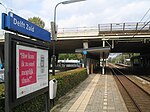Reactor Institute Delft
AC with 0 elementsNuclear research institutes

The Reactor Institute Delft (Dutch: Reactor Instituut Delft), or RID, is a nuclear research institute at Delft University of Technology in Delft, Netherlands. The institute features the Hoger Onderwijs Reactor (HOR, Dutch: Higher Education Reactor), a 2 MWt pool-type research reactor. Neutron research instruments are developed using several neutron beam lines leading from the core. One of the most intense positron beam lines in the world is powered by gamma-pair production near the reactor core.
Excerpt from the Wikipedia article Reactor Institute Delft (License: CC BY-SA 3.0, Authors, Images).Reactor Institute Delft
Mekelweg, Delft
Geographical coordinates (GPS) Address Nearby Places Show on map
Geographical coordinates (GPS)
| Latitude | Longitude |
|---|---|
| N 51.9905 ° | E 4.3806 ° |
Address
Mekelweg
Mekelweg
2629 JB Delft
South Holland, Netherlands
Open on Google Maps







